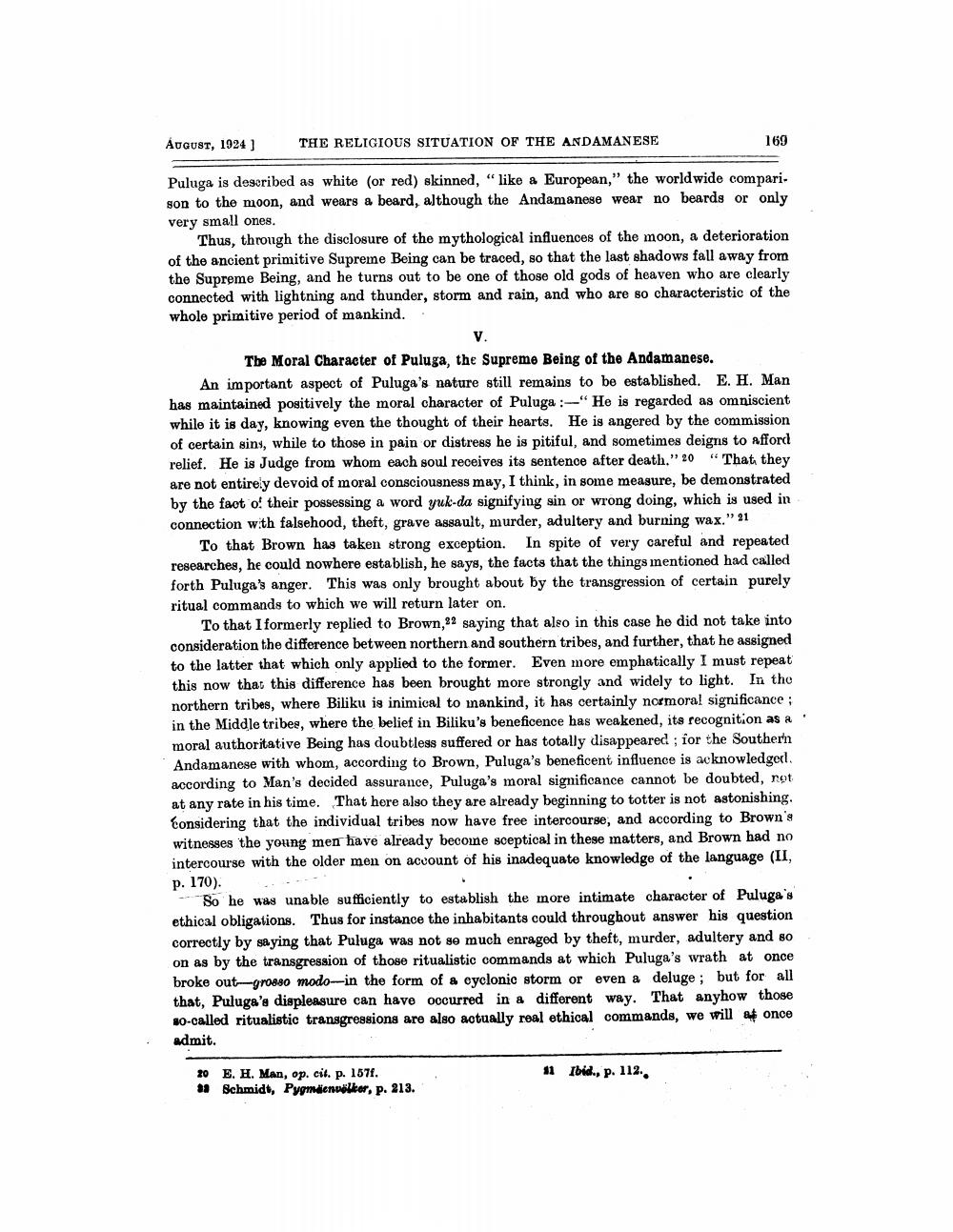________________
AUGUST, 1924 ]
THE RELIGIOUS SITUATION OF THE ANDAMANESE
169
Puluga is described as white (or red) skinned, "like a European," the worldwide compari. son to the moon, and wears a beard, although the Andamanese wear no beards or only very small ones.
Thus, through the disclosure of the mythological influences of the moon, a deterioration of the ancient primitive Supreme Being can be traced, so that the last shadows fall away from the Supreme Being, and he turns out to be one of those old gods of heaven who are clearly connected with lightning and thunder, storm and rain, and who are so characteristic of the whole primitive period of mankind..
The Moral Character of Puluga, the Supreme Being of the Andamanese. An important aspect of Puluga's nature still remains to be established. E. H. Man has maintained positively the moral character of Puluga :-"He is regarded as omniscient while it is day, knowing even the thought of their hearts. He is angered by the commission of certain sins, while to those in pain or distress he is pitiful, and sometimes deigns to afford relief. He is Judge from whom each soul receives its sentence after death." 20 "That they are not entirely devoid of moral consciousness may, I think, in some measure, be demonstrated by the fact o! their possessing a word yuk-da signifying sin or wrong doing, which is used in connection with falsehood, theft, grave assault, murder, adultery and burning wax." 31
To that Brown has taken strong exception. In spite of very careful and repeated researches, he could nowhere establish, he says, the facts that the things mentioned had called forth Puluga's anger. This was only brought about by the transgression of certain purely ritual commands to which we will return later on.
To that I formerly replied to Brown,32 saying that also in this case he did not take into consideration the difference between northern and southern tribes, and further, that he assigned to the latter that which only applied to the former. Even more emphatically I must repeat this now that this difference has been brought more strongly and widely to light. In the northern tribes, where Biliku is inimical to inankind, it has certainly normoral significance : in the Middle tribee, where the belief in Biliku's beneficence has weakened, its recognition as a moral authoritative Being has doubtless suffered or has totally disappeared ; ior the Southern Andamanese with whom, according to Brown, Puluga's beneficent influence is acknowledgeil. according to Man's decided assurance, Puluga's moral significance cannot be doubted, rot at any rate in his time. That here also they are already beginning to totter is not astonishing. Considering that the individual tribes now have free intercourse, and according to Brown' witnesses the young men have already become sceptical in these matters, and Brown had no intercourse with the older men on account of his inadequate knowledge of the language (II, p. 170). - So he was unable sufficiently to establish the more intimate character of Puluga's ethical obligations. Thus for instance the inhabitants could throughout answer his question correctly by saying that Puluga was not se much enraged by theft, murder, adultery and so on as by the transgression of those ritualistic commands at which Puluga's wrath at once broke out-grosso modo--in the form of a cyclonic storm or even a deluge ; but for all that, Puluga's displeasure can have occurred in a different way. That anyhow those NO-called ritualistic transgressions are also actually real ethical commands, we will once admit.
11
20 *
E. H. Man, op. cit. p. 1571. Schmidt, Pygmdienuollor, p. 213.
Ibid., p. 112.
3.




